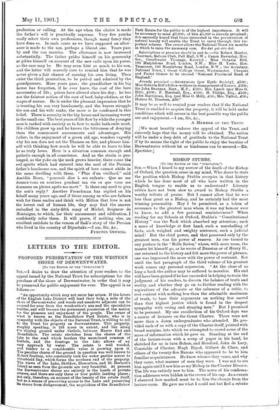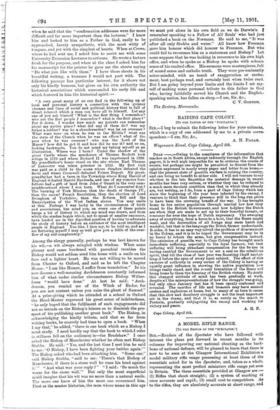BISHOP STITBBS.
(To THE EDITOR OF THE 'SPECTATOR."] Sia,—When I heard to my sorrow of the death of the Bishop of Oxford, the question arose in my mind, Who dares to state the position which Bishop Stubbs occupies in that history which he has done most of all who have written in the English tongue to enable us to understand? Literary critics have not been slow to award to Bishop Stubbs a worthy tribute of praise. But I cannot allow that he was less than great as a Bishop, and he certainly had the most winning personality. May I be permitted, as a token of reverence to the greatest man whom it was my honour ever to know, to add a few personal reminiscences ? When reading for my Schools at Oxford, Stubbs's "Constitutional History" was the took which absorbed my attention; such a mass of knowledge at first hand, such a marshalling of facts, such weighed and weighty sentences, such a judicial mind ! But the chief power, and that possessed only by the greatest men, was his power of reserve. As one turned to any preface in the "Rolls Series," where, with more room, the master let himself go, as he wrote of Dunstan or of Henry II., one returned to the history and felt more the power of phrases, one was impressed the more with the power of restraint. Not until the last paragraph of the third volume of his greatest work comes any personal expression. "At the close of so long a book the author may be suffered to moralise. His end will have been gained if he has succeeded in helping to train the judgment of his readers, to discern the balance of truth and reality, and whether they go on to further reading with the aspirations of the advocate or the calmness of a critic, to rest content with nothing less than the attainable maximum of truth, to base their arguments on nothing less sacred than that highest justice which is found in the deepest sympathy with erring and straying men." But I promised to be personal. My one recollection of his Oxford days was a course of lectures on the Great Charter. There were not more than a dozen undergraduates who attended. He pro- vided each of us with a copy of the Charter itself, printed with broad margins, into which we attempted to crowd some of the mass of information which he gave us. Standing at the end of the lecture-room with a scrap of paper in his hand, he sketched for us in turn Bohun, and Hereford, John de Lacy, Constable of Chester, Hugh Bigod, Gilbert de Clare, and others of the twenty-five Barons who appeared to be to him familiar acquaintances. He knew whence they came, and why they came, what manner of men they were. I was not to see him again until I saw him as my Bishop in the Chester Diocese. The life was entirely new to him. The notes of his confirma- tion addresses were hidden in the crown of his cap. As a curate I observed how marked must be to him the change from the lecture-room. He gave me what I could not but feel a rebuke when he said that the "confirmation addresses were far more difficult and far more important than the lectures." I knew him and looked to him as a Father in God, easily to be approached, keenly sympathetic, with the most witty of tongues, and yet with the simplest of hearts. When at Crewe, where he had sent me, I asked him to assist me with some University Extension Lectures to artisans. He wrote a lecture fresh for the purpose, and when at the close I asked him for his manuscript for the printer he gave me the sheets saying "Do what you like with them." I have those sheets in his beautiful writing, a treasure I would not part with. The following passage has particular interest, for it shows not only his kindly humour, but gives on his own authority the historical associations which surrounded his early life and which fostered in him the historical spirit :— " A very great many of us can find in the following up of local and personal history a connection with the greater streams and lines of social and political history that is full of direct interest which a man can have all to himself. Let any one of you ask himself What is the first thing I remember? who are the first people I remember ? what is the first place p Put it down. I wonder how much my parents can remember about my native place ? what did any of them do ? was my father a soldier? was he a churchwarden? was he an overseer ? What wars were on when he was in the Militia ? what was the state of the Church when he was an officer ? what of the poor when he was overseer ? who was the Lord of the Manor ? how did he get it and how did he use it? and so on, looking backwards. You do not mind my taking myself as an illustration. Where was I born ? Under the shadow of the great Castle where the murderers of Thomas Beckett took refuge in 1170 and where Richard II. was imprisoned in 1399. My grandfather's house stood on the site where Earl Thomas of Lancaster was taken prisoner in 1322. My first visit was paid as a child to the scene where Stephen defeated the Scots and where Cromwell defeated Prince Rupert. My great- grandfather had a farm in the Township where King Harold of England d. feated Harold Hardrada, and one of my remoter fore- fathers had a gift of land from John o' Gaunt in the very same neighbourhood where I was born. What do I remember first ? The burning of York Minster, then the death of George IV., then the second French Revolution, then the election of Lord Brougham of Yorkshire, then the Reform Bill and the Emancipation of the West Indian slaves. You may smile at this. Perhaps I was lucky in the circumstances of birth and associations, but mind you, on every one of these points bangs a lot of history to which my mind was drawn, and from which the studies began which, not to speak of smaller successes, have landed me in the dignified position of having to advocate the study of history before an audience of the most intelligent people in England. You like, I dare say, to be told so, and as I am flattering myself I may as well give you a little of the over- flow of my self-complacency."
Among the clergy generally, perhaps he was best known for his wit,—a wit always mingled with wisdom. When some gloomy soul came burdened with parochial troubles the Bishop would not seldom send him home with a smile on his face and a lighter heart. He was not willing to be moved from Chester to Oxford, and said as he left the Chapter House: "I am like Homer, I suffer from translation." In his new diocese a well-meaning Archdeacon constantly informed him of what under similar circumstances Bishop Wilber- force "would have done." At last he said: " Arch- deacon, you remind me of the Witch of Endor, for you are not content unless you raise the ghost of SamueL" At a prize-giving which he attended at a school in Oxford the Head-Master expressed his great sense of indebtedness, "he only hoped that the fulfilment of such engagements did
not so intrude on the Bishop's leisure as to diminish the pro- spect of his publishing another great book." The Bishop, in
acknowledging the kindly tribute, said that so far from writing books, he scarcely had time to open a book. "When I say that," he added, "there is one book which as a Bishop I must study. I need hardly say that the book to which I refer (a stillness fell on the audience) is—the Bradshaw." I once asked the Bishop of Manchester whether he often met Bishop Stubbs. He said: "Yes, and the last time I met him he said to me: 0 Bishop, I have been fighting your battles again." The Bishop asked who had been attacking him. "Some one," said Bishop Stubbs, "said to me : There's that Bishop of Manchester, if there is a stone wall he runs his head against
" "And what was your reply F" "I said: So much the worse for the stone wall." But only the most superficial could imagine that his wit was no more than a natural smile. The more one knew of him the more one reverenced him. First as the master historian, the man whose name in this age
we must put alone in his own field as we do Darwin's. I remember speaking to a Fellow of All Souls' who had just published a book on the Normans. He said to me, "It was after all only Stubbs and water." All know how Freeman gave him honour which did honour to Freeman. But who could fail to reverence him as a statesman and Bishop ? Let none suppose that he was lacking in reverence to his own high office, and when he spoke as a Bishop he spoke with solemn sense of his exalted office. His sermons were masterpieces, full of sound sense and catholic truth. They were pre-eminently sober-minded, with no touch of exaggeration or excite- ment, best perhaps read, and certainly beet when twice read. But I am going beyond your limits and the limits I set my- self of making some personal tribute to this father in God who, having faithfully served his Church and the English- speaking nation, has fallen on sleep.—I am, Sir, &c.,







































 Previous page
Previous page